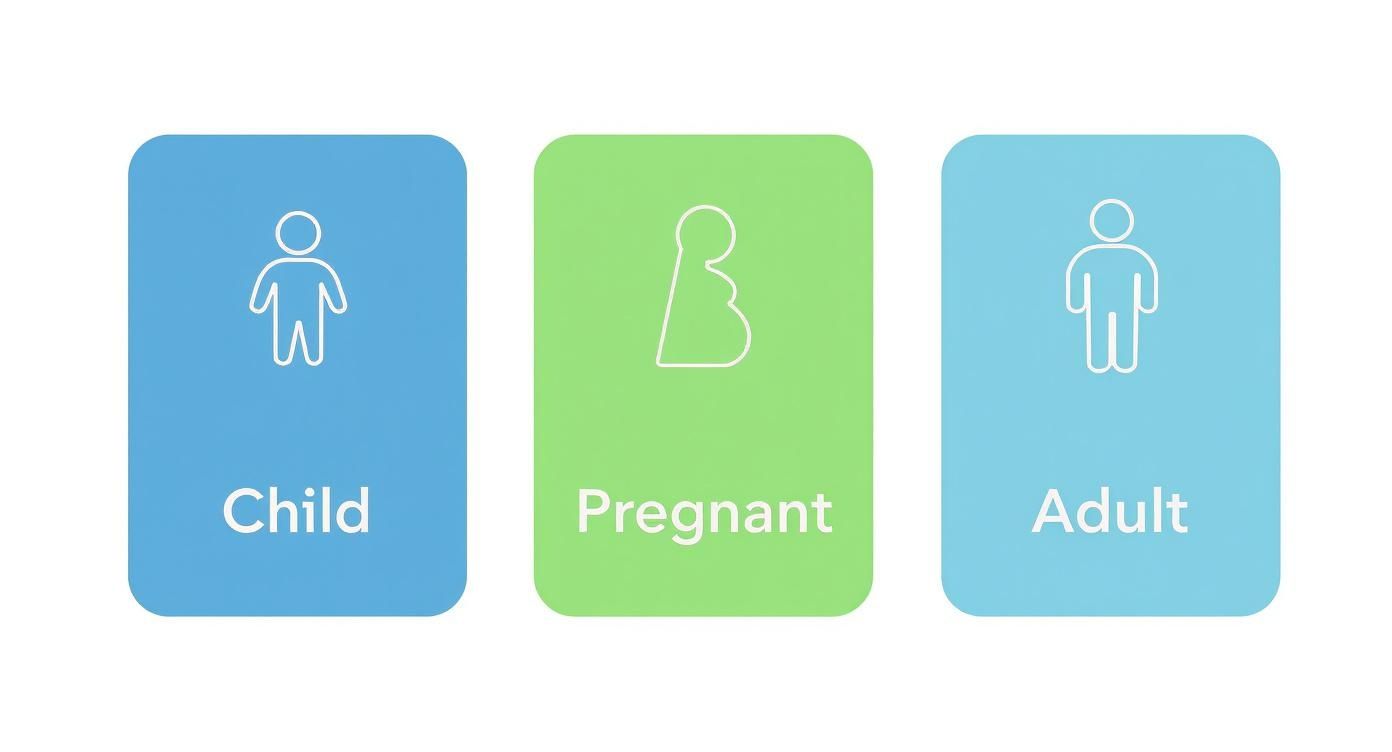Before you even start filling out the NJ Family Care application, it’s good to get the lay of the land. Think of this program as New Jersey's public health insurance plan. It rolls together Medicaid and the Children's Health Insurance Program (CHIP) to give free or low-cost healthcare to residents who qualify. For many families, it's an absolute lifeline.
What Is NJ FamilyCare and Who Does It Cover?
NJ FamilyCare is essentially a safety net, making sure everyone has access to the medical care they need, regardless of their income. The program is built to support a really wide range of people, so healthcare doesn't have to be a source of financial stress. When you apply, you're not just getting an insurance card; you're connecting to a system designed to keep our communities healthy.
The program's reach is pretty extensive, and understanding who it’s for can save you a lot of time before you get buried in paperwork.
Who Is Eligible for Coverage?
NJ FamilyCare opens its doors to several key groups across the state, which is what makes it so impactful. Generally, the folks who are covered include:
- Children: Any income-eligible child under 19 can get coverage.
- Pregnant Individuals: The program offers comprehensive care throughout pregnancy and for 60 days after giving birth.
- Parents and Caretaker Relatives: If you're a low-income parent or a relative taking care of dependent kids, you might qualify.
- Childless Adults: Coverage also extends to adults between the ages of 19-64 who meet the income guidelines.
- Seniors and Individuals with Disabilities: Specific programs under the NJ FamilyCare umbrella, like various Medicaid waivers, provide specialized services. To get a better handle on this, you can check out our guide on the New Jersey Medicaid waiver program.
Just how critical is this program? During the COVID-19 pandemic, enrollment shot up to a peak of 2.29 million people by mid-2023. That's a nearly 78% increase from a decade earlier, which really shows how essential this coverage is, especially when a public health crisis hits.
NJ FamilyCare is more than just an insurance plan. It’s the state's commitment to the health of its residents, from toddlers to grandparents. It’s designed to ensure your financial situation isn't a barrier to getting good medical care.
As you get your finances in order for the application, it can be helpful to use other local tools to get a full picture. For example, a New Jersey Sales Tax Calculator can give you a bit more insight into the economic factors that might be affecting your household budget.
How to Check Your NJ FamilyCare Eligibility
https://www.youtube.com/embed/UWgXLW8HKJ0
Before you dive into the NJ Family Care application, it’s a good idea to make sure you actually qualify. Eligibility isn't as simple as just looking at your income; it's a mix of different factors that give a complete picture of your household’s situation.
At its core, NJ FamilyCare eligibility comes down to a few key things. You have to be a New Jersey resident, a U.S. citizen or a qualified non-citizen, and, of course, meet specific income guidelines. These income limits aren’t a one-size-fits-all deal—they shift based on who the application is for and the number of people in your home.
Understanding the Core Requirements
Let's unpack what the state really looks at. For instance, the income limit for a single parent with two kids is quite a bit higher than it is for a single adult without any dependents. This is designed to make sure families with bigger financial responsibilities get the help they need.
This infographic does a great job of showing how the path to eligibility can fork depending on whether you're applying for a child, a pregnant woman, or another adult.

As you can see from that decision tree, the route to coverage is often more straightforward for children and pregnant individuals. They frequently qualify even at higher income levels.
Other things in your life can also make a big difference. If you're 65 or older or have a disability, you might be evaluated under a different set of rules that could include limits on your assets in addition to your income.
Key Takeaway: Never assume you won't qualify based on income alone. NJ FamilyCare has a lot of different pathways, especially for kids, expectant mothers, and people with specific medical needs. It's always worth checking the official guidelines.
If your income happens to be just a bit over the limit for standard Medicaid, you might still qualify but have to cover a portion of your medical costs. Trying to figure out things like "cost-sharing" can feel confusing, but using a specialized Medicaid spend down calculator can really help clarify what you might have to pay out of pocket.
A Look at Income Guidelines
To give you a better sense of what this looks like in practice, here is a simplified table showing how income limits can vary. Just keep in mind that these numbers are based on what’s called Modified Adjusted Gross Income (MAGI) and they get updated. For the most current figures, you should always check the official NJ FamilyCare website.
NJ FamilyCare Monthly Income Guidelines (Example)
This table shows estimated monthly income limits for NJ FamilyCare eligibility based on household size. Note: These are illustrative figures and can change.
| Household Size | Maximum Monthly Income (Children/Parents) | Maximum Monthly Income (Childless Adults) |
|---|---|---|
| 1 Person | N/A (for parents) | ~$1,800 |
| 2 People | ~$3,000 | ~$2,400 |
| 3 People | ~$3,800 | ~$3,100 |
| 4 People | ~$4,600 | ~$3,700 |
As you can see, a family of three (like a single mom with two kids) might be able to qualify with a monthly income up to around $3,800. On the other hand, a single adult with no children would need to make less than $1,800.
These differences really underscore the program's goal of supporting families. When you sit down to fill out your NJ Family Care application, you'll be asked for documents to prove these details, which is exactly why getting a clear picture of where you stand right now is so important.
Gathering the Right Documents for Your Application

Let's be honest, nobody enjoys gathering paperwork. But if there's one piece of advice I can give you, it's this: get all your documents in order before you even look at the application form.
Submitting an incomplete NJ Family Care application is the single fastest way to get your case delayed. A little bit of prep work now prevents the back-and-forth headache later, which can add weeks to your approval time. Think of it as building your complete case file upfront.
Proof of Identity and Citizenship
First things first, the state needs to know who you are and confirm your legal status. This is a standard check for any government program, so it’s best to have these documents ready for everyone in your household who is applying.
For identity, a simple government-issued photo ID will do the trick. For citizenship or immigration status, you'll need something more specific.
- Valid Photo ID: A current driver’s license, a state-issued non-driver ID, or a U.S. Passport are perfect.
- Citizenship Proof: Your U.S. birth certificate is the go-to here. A Certificate of Naturalization or a U.S. Passport also works great.
- Immigration Status: If you're a non-citizen, you'll need to provide copies of documents like your Permanent Resident Card (often called a Green Card), an I-94 form, or other official paperwork from USCIS that verifies your qualified immigration status.
Verifying Your New Jersey Residency
Next up, you have to prove you actually live in New Jersey. This is a non-negotiable step to show you're eligible for state benefits.
You'll need a document that clearly shows your name and current New Jersey address. The key here is "current"—it usually has to be dated within the last 60 days.
Pro Tip: Don't just grab the first piece of mail you see. Your best bets are a recent utility bill (think gas, electric, or water), your current signed lease agreement, or a formal letter from your landlord. If you can't find those, a recent bank statement or another official government letter will also work.
Documenting Your Household Income
This is where things can get a little tricky because money comes from all sorts of places. The goal is to give a complete and honest picture of every dollar your household earns each month.
If you work a regular job with consistent paychecks, this part is pretty simple. Just gather your most recent pay stubs covering the last four to six weeks. If your income isn't as straightforward, you'll need different kinds of proof.
- If You're Self-Employed: Pull out your most recent tax return (a Schedule C is great) along with your business's income and expense records.
- If You Get Paid in Cash: You'll need a signed and dated letter from your employer. It should be on company letterhead and state your hourly pay, how many hours you work each week, and how often you get paid.
- Other Income Sources: Don't forget to include proof for things like Social Security benefits, unemployment statements, pension payments, or any child support you receive.
While it's not usually necessary for the standard application, some unique situations might require you to provide a notarized statement. It's rare, but it's helpful to know what that entails. You can learn more about commonly notarized documents to be prepared for anything.
Having all this organized from the start will make the rest of the application process feel so much easier.
Navigating the NJ Family Care Application Form
Opening the NJ Family Care application for the first time can feel a bit like staring at a tax form—it's dense, official, and packed with questions. But don't let that overwhelm you. Every section is there for a reason: to build a clear picture of your household so the state can accurately figure out if you qualify.
Think of the application as telling your family's story. They're not just looking for random numbers; they’re trying to understand your unique situation. We’ll break down the key parts to help you tell that story correctly and sidestep the common mistakes that lead to frustrating delays.
The official NJ FamilyCare website is your home base for the application and all related information. Here’s a quick look at the homepage where your journey begins.

This is your starting point for either applying online or downloading a paper version to mail in. Getting familiar with it is the first real step in the process.
Who Counts in Your Household
One of the first places people get tripped up is defining their household. It sounds simple, but the state has specific rules. You need to list everyone who lives with you, even if they aren't the ones applying for health coverage.
Why does this matter so much? Because NJ FamilyCare bases its income limits on the total household size, not just on how many people need insurance.
For instance, picture a single mom applying for her two kids. She must list herself and both children, making the household size three. If she forgot to include herself because she already has insurance, or a sibling who also lives there, the state might make the wrong decision on her children's eligibility.
- List everyone under your roof. This means your spouse, all children under 21, and any other relatives you financially support.
- Be clear about who needs coverage. The form has a spot to check a box for each person applying.
- Explain the relationships. You'll need to state how each person is related to the main applicant (e.g., spouse, son, daughter).
Key Takeaway: Your "household" isn't just who needs insurance; it's the entire family unit living together. Getting this right from the start is crucial for a smooth and quick application review.
Reporting Your Income Accurately
The income section is truly the heart of the NJ Family Care application. Honesty and detail are your best friends here. You have to report every source of income for every household member, not just for the person filling out the form.
This is another spot where mistakes happen all the time, especially for people with gig work or fluctuating pay. Let's walk through two different scenarios to see how income reporting can change based on your situation.
Example Scenario One: A Salaried Employee
Maria works a full-time job and gets a regular paycheck every two weeks. When she applies, she needs to report her gross income—that’s the amount before taxes and other deductions are taken out. A very common error is to use the net (or take-home) pay, which makes her income look lower than it actually is. She would then send in her last four pay stubs to prove this amount.
Example Scenario Two: A Freelance Contractor
David is a freelance graphic designer, so his income is different every month. He can't just report what he made last month. Instead, he should calculate his average monthly income from the past few months. Another way is to use his most recent tax return (specifically, the net profit from his Schedule C) to give a more accurate yearly picture. He’d need to submit his tax forms and maybe even bank statements or invoices as proof.
Forgetting to report all sources of income, like a small side gig or unemployment benefits, could get your application denied. Even worse, you could be asked to pay back benefits later on. Be thorough and have documents ready for everything. Taking this extra step helps caseworkers process your application without having to stop and ask for more information—which is one of the biggest causes of delays.
Submitting Your Application and What to Expect Next

You've done the hard part—filling out every field and double-checking your documents. Now, it's time to submit your NJ Family Care application. You have a few choices here, and honestly, picking the right one can make a big difference in how quickly you get a decision.
There are three main ways to get your application in: online, by mail, or in person at your County Board of Social Services. While they all work, I almost always recommend the online portal. It's simply the most efficient path forward.
When you submit online, you get an instant confirmation number. That number is your proof that the state has your file. It also creates a digital trail, making it much easier to track your status down the road. Mail is a reliable option, of course, but you're adding transit time and you won't get that immediate feedback.
The Waiting Game and How to Track Your Progress
After you hit "submit" or drop the envelope in the mail, the waiting period begins. This is where a little patience comes in handy, as the state has a high volume of applications to review.
So, how long will you be waiting? Generally, you can expect the review process to take anywhere from 30 to 45 days. Sometimes it's faster, especially for expedited cases like applications for pregnant women. If your financial situation is complex, it might take a bit longer.
The best way to stay in the loop is to use the online portal to check your application status. You can see if it’s pending, approved, or if the state needs more information from you. It's also crucial to keep a close eye on your mailbox during this time.
Be on high alert for any official mail from the State of New Jersey or your county's social services office. If they request additional documents, responding immediately is the single most important thing you can do to prevent your application from being delayed or denied.
Understanding the Scale of NJ FamilyCare
That thorough review process makes sense when you consider just how many people this program serves. NJ FamilyCare is a vital safety net for about 20% of everyone living in New Jersey, providing essential care to our most vulnerable groups.
As of early 2025, enrollment hit a staggering 1,821,219 people. Over 300,000 of those individuals are older adults and people with disabilities. You can review the state's official report on NJ FamilyCare enrollment for a closer look at these numbers.
This vast scope really underscores why every detail on your application matters. Once a decision is made, you'll receive an official determination letter in the mail. If you're approved, this letter will explain your coverage, which health plans are available to you, and how to select one.
If you’re navigating other parts of the system as well, you might find our guide on how to apply for Medicaid to be a useful resource.
Common Questions About Applying for NJ FamilyCare
Even when you've done your homework and gathered every last document, it’s completely normal to have questions pop up during the NJ FamilyCare application process. A few "what if" scenarios are bound to run through your mind.
We’ve pulled together some of the most common questions we hear to give you clear, straightforward answers. Think of this as your go-to guide for those little worries that can slow you down.
How Long Does NJ FamilyCare Approval Take?
This is probably the biggest question on everyone's mind. Generally, you should expect the approval process to take somewhere between 30 to 45 days. But that's not a hard and fast rule.
The exact timing can shift based on a few things, like how complex your family's situation is, the sheer volume of applications the state is handling at the moment, and whether you submitted a complete, error-free application. One thing to note is that cases for pregnant applicants are often fast-tracked, which usually means a quicker decision. To keep the ball rolling, your best bet is to apply online and respond to any requests for more information as fast as you can.
What If My Income Changes After I Apply?
Life happens, and your financial situation can change in the blink of an eye. If your household income goes up or down—or if your family size changes—you are required to report it to NJ FamilyCare within 10 days.
You can handle these updates through your online account, by giving the service center a call, or by stopping by your County Board of Social Services. A drop in income could actually mean you qualify for more help, while a significant increase might shift you to a different coverage plan.
It's so important to report these changes on time. If you don't, it can lead to major headaches down the road, including having to repay benefits if it turns out you were ineligible for a period of time.
Can Non-U.S. Citizens Apply for NJ FamilyCare?
Yes, absolutely. Many non-U.S. citizens are eligible for NJ FamilyCare. This includes lawful permanent residents (green card holders), refugees, asylees, and a number of other qualified immigration statuses.
For adults, there is often a five-year waiting period after gaining their qualified status. However, this rule doesn't apply to two very important groups:
- Children under 19
- Pregnant individuals
What's really great is that New Jersey provides state-funded coverage for all income-eligible kids, no matter their immigration status. This ensures every child can get the care they need to thrive.
What Should I Do If My Application Is Denied?
Getting a denial letter in the mail is tough, but don't let it discourage you. It’s not always the end of the road. The notice will clearly explain why the decision was made, and you have every right to appeal it.
To start the process, you'll need to request a Fair Hearing. Your denial letter will have detailed instructions on exactly how to do this and the deadline you need to meet, which is usually 20 days. Sometimes, a denial is just the result of a simple clerical error or a misunderstanding, so appealing is often worth the effort. If you need help, consider reaching out to a local legal aid organization for free guidance.
Navigating healthcare options for your loved ones can be a complex journey. At NJ Caregiving, we provide compassionate and professional in-home care to support seniors and individuals with disabilities, ensuring they receive the personalized attention they deserve. Learn more about our services at https://njcaregiving.com.


